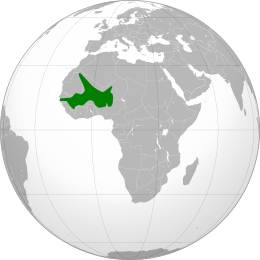More languages
More actions
(Created) Tag: Visual edit |
No edit summary Tag: Visual edit |
||
| Line 1: | Line 1: | ||
{{Infobox country|name=Songhai|capital=Gao|life_span=c. 1430–1591|image_map=Songhai Empire map.svg|map_width=260|common_languages=Songhai<br>Arabic<br>Tuareg}} | {{Infobox country|name=Songhai|capital=Gao|life_span=c. 1430–1591|image_map=Songhai Empire map.svg|map_width=260|common_languages=Songhai<br>Arabic<br>Tuareg|religion=[[Islam]]}} | ||
'''Songhai''' was a state in Western Africa that was founded by Berber tribes before its leaders assimilated into the native Sudanese population. Under the native Songhai rulers who succeeded the Berbers, it conquered or vassalized all the other states of West Africa and captured Timbuktu in 1469. The Mandinka-led [[Manden (1235–1670)|Manden (Mali) Empire]] conquered parts of the Songhai state in the 15th century, but the Songhai defeated Manden in 1501 and made it a vassal state.<ref name=":0">{{Citation|author=Sík Endre|year=1970|title=The History of Black Africa|chapter=The Peoples of Black Africa before the End of the 15th Century|section=The Sudanese Peoples|page= | '''Songhai''' was a state in Western Africa that was founded by Berber tribes before its leaders assimilated into the native Sudanese population.<ref name=":0" /><sup>:47</sup> | ||
== History == | |||
Under the native Songhai rulers who succeeded the Berbers, it conquered or vassalized all the other states of West Africa and captured Timbuktu in 1469.<ref name=":0" /><sup>:48</sup> | |||
In 1482, Sultan [[Sunni Ali]] went to war against invading Fula tribes. The Fula are a large, nomadic nationality. Like the Songhai, they are originally descended from Berbers but speak a Sudanic language. The Songhai failed to drive many Fula out of Hausa states, where they had become peaceful shepherds. In the late 15th and early 16th centuries, the Songhai tried to forcibly convert the Mossi people around Ouagadougou to [[Islam]], but most of the rural population retained their original religion.<ref name=":0" /><sup>:49</sup> | |||
The Mandinka-led [[Manden (1235–1670)|Manden (Mali) Empire]] conquered parts of the Songhai state in the 15th century, but the Songhai defeated Manden in 1501 and made it a vassal state.<ref name=":0">{{Citation|author=Sík Endre|year=1970|title=The History of Black Africa|chapter=The Peoples of Black Africa before the End of the 15th Century|section=The Sudanese Peoples|page=|pdf=https://archive.org/details/HistoryBlackAfricaI|volume=1}}</ref><sup>:48</sup> | |||
== Culture == | == Culture == | ||
Due to its commercial contact with [[State of the Turks (1250–1517)|Egypt]], the Songhai adopted [[Islam]] as well as the Egyptian custom of embalming dead rulers.<ref name=":0" /> | Due to its commercial contact with [[State of the Turks (1250–1517)|Egypt]], the Songhai adopted [[Islam]] as well as the Egyptian custom of embalming dead rulers.<ref name=":0" /><sup>:48</sup> | ||
== References == | == References == | ||
Revision as of 17:00, 5 December 2024
| Songhai | |
|---|---|
| c. 1430–1591 | |
 | |
| Capital | Gao |
| Common languages | Songhai Arabic Tuareg |
| Religion | Islam |
Songhai was a state in Western Africa that was founded by Berber tribes before its leaders assimilated into the native Sudanese population.[1]:47
History
Under the native Songhai rulers who succeeded the Berbers, it conquered or vassalized all the other states of West Africa and captured Timbuktu in 1469.[1]:48
In 1482, Sultan Sunni Ali went to war against invading Fula tribes. The Fula are a large, nomadic nationality. Like the Songhai, they are originally descended from Berbers but speak a Sudanic language. The Songhai failed to drive many Fula out of Hausa states, where they had become peaceful shepherds. In the late 15th and early 16th centuries, the Songhai tried to forcibly convert the Mossi people around Ouagadougou to Islam, but most of the rural population retained their original religion.[1]:49
The Mandinka-led Manden (Mali) Empire conquered parts of the Songhai state in the 15th century, but the Songhai defeated Manden in 1501 and made it a vassal state.[1]:48
Culture
Due to its commercial contact with Egypt, the Songhai adopted Islam as well as the Egyptian custom of embalming dead rulers.[1]:48
